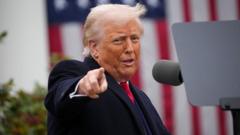President Donald Trump has enacted a 90-day delay on higher tariffs for most countries while increasing tariffs on Chinese goods amid escalating trade tensions.
Trump Delays Tariff Increases for 90 Days Amid Intensified Trade War with China

Trump Delays Tariff Increases for 90 Days Amid Intensified Trade War with China
Trade tensions rise as Trump's new tariffs on China escalate but pause for others.
The recent developments underscore a dramatic shift in Trump's tariff strategy, as he seeks to navigate complex global trade relationships. In an official announcement, the President revealed that he would pause a set of tariffs affecting around 60 nations, implementing a standard “lowered reciprocal tariff” of 10% as negotiations continue. However, tensions with China have taken a fiery turn, with Trump's decision to boost tariffs on Chinese imports to a staggering 125%.
The President's rhetoric suggests growing frustration with Beijing, accusing China of lacking respect following its retaliation with an 84% tariff on American goods. This latest escalation comes after a turbulent week for global markets, which have seen trillions in losses since Trump initially announced a broad import tax on all goods entering the United States.
This sweeping tax plan, introduced last week, set a foundational 10% tariff on all imports but incorporated higher penalties for countries deemed “worst offenders” of unfair trade practices. Nations including the European Union, Vietnam, and South Africa fall under this designation.
In the wake of Trump's tariff announcements, U.S. stock markets experienced major fluctuations, with sell-offs contributing to significant downturns across the globe. Following Wednesday's announcement about the tariff delays, there was a noticeable rebound in the markets, with the S&P 500 climbing 7% during afternoon trading.
Trump took to his Truth Social platform to communicate the 90-day pause, highlighting that over 75 countries have initiated negotiations with the U.S., prompting a change in strategy concerning the impending higher tariffs.
As it stands, the new rules mean that all “worst-offending” countries will only face a 10% tariff except for China, on which additional tariffs will be immediately enforced. Trump conveyed hopes that China would eventually recognize the unsustainability of its current trade practices.
Meanwhile, Treasury Secretary Scott Bessent has insisted that this shift in policy was not influenced by the recent market downturns, even as political rivals, including Democratic Senator Chuck Schumer, accuse the administration of retreating in the face of mounting pressure.
The ongoing standoff between the U.S. and China represents a broader conflict between the two largest economies in the world, ignited by Trump's previous tariffs that saw China hit with a substantial increase, compounding pressure on the economic relationship. Following this, China's government swiftly retaliated, further exacerbating trade hostilities.
As negotiations continue, tensions remain high, with each side digging in on their positions. China's foreign ministry has condemned U.S. actions as abusive, stressing the need for equitable negotiation to resolve these trade disputes.
The President's rhetoric suggests growing frustration with Beijing, accusing China of lacking respect following its retaliation with an 84% tariff on American goods. This latest escalation comes after a turbulent week for global markets, which have seen trillions in losses since Trump initially announced a broad import tax on all goods entering the United States.
This sweeping tax plan, introduced last week, set a foundational 10% tariff on all imports but incorporated higher penalties for countries deemed “worst offenders” of unfair trade practices. Nations including the European Union, Vietnam, and South Africa fall under this designation.
In the wake of Trump's tariff announcements, U.S. stock markets experienced major fluctuations, with sell-offs contributing to significant downturns across the globe. Following Wednesday's announcement about the tariff delays, there was a noticeable rebound in the markets, with the S&P 500 climbing 7% during afternoon trading.
Trump took to his Truth Social platform to communicate the 90-day pause, highlighting that over 75 countries have initiated negotiations with the U.S., prompting a change in strategy concerning the impending higher tariffs.
As it stands, the new rules mean that all “worst-offending” countries will only face a 10% tariff except for China, on which additional tariffs will be immediately enforced. Trump conveyed hopes that China would eventually recognize the unsustainability of its current trade practices.
Meanwhile, Treasury Secretary Scott Bessent has insisted that this shift in policy was not influenced by the recent market downturns, even as political rivals, including Democratic Senator Chuck Schumer, accuse the administration of retreating in the face of mounting pressure.
The ongoing standoff between the U.S. and China represents a broader conflict between the two largest economies in the world, ignited by Trump's previous tariffs that saw China hit with a substantial increase, compounding pressure on the economic relationship. Following this, China's government swiftly retaliated, further exacerbating trade hostilities.
As negotiations continue, tensions remain high, with each side digging in on their positions. China's foreign ministry has condemned U.S. actions as abusive, stressing the need for equitable negotiation to resolve these trade disputes.





















